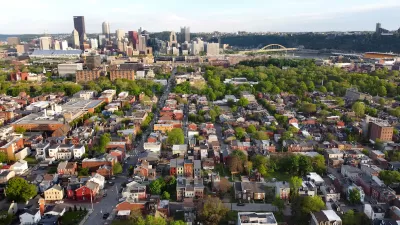Analysis indicates that compact development reduces the time urban residents spent in traffic and requires less spending on highways.
This new study by CEOs for Cities critiques methods used to measure traffic congestion costs and evaluate congestion reduction strategies. It criticizes the Travel Time Index (TTI) used in the commonly-cited Urban Mobility Report as an unreliable guide for understanding the nature and extent of urban transportation problems. The TTI uses flawed speed and fuel economy estimates which overstate traffic congestion costs, and it ignores the increased transportation costs associated with more dispersed land use patterns. As a result, the TTI favors policies that stimulate automobile dependency and sprawl.
The Urban Mobility Report's claims about growing congestion do not correlate with other measures of travel times. Urban Mobility Report's estimates of congestion delay are inconsistent with real-time traffic data, and travel times reported in travel surveys.
Driven Apart recommends that urban transportation system performance be evaluated based on Hours of Peak Period Travel, which recognizes the time and fuel cost savings that result from more compact and mixed land use which reduces travel distances. It recommends a new approach to measuring urban transport system performance that reflects these elements:
1. Emphasize accessibility - the proximity and convenience of destinations - not just mobility.
2. Include comprehensive measures of land uses, trip lengths and mode choices as well as travel speeds.
3. Incorporate new and better data on travel speeds and commuting patterns.
4. Adopt an open, multi-disciplinary process to select, validate and continuously improve measures.
5. Provide measures that can be used to guide policy and evaluate investments rather than simply raise alarm about traffic delays.

Planetizen Federal Action Tracker
A weekly monitor of how Trump’s orders and actions are impacting planners and planning in America.

Restaurant Patios Were a Pandemic Win — Why Were They so Hard to Keep?
Social distancing requirements and changes in travel patterns prompted cities to pilot new uses for street and sidewalk space. Then it got complicated.

Map: Where Senate Republicans Want to Sell Your Public Lands
For public land advocates, the Senate Republicans’ proposal to sell millions of acres of public land in the West is “the biggest fight of their careers.”

Maui's Vacation Rental Debate Turns Ugly
Verbal attacks, misinformation campaigns and fistfights plague a high-stakes debate to convert thousands of vacation rentals into long-term housing.

San Francisco Suspends Traffic Calming Amidst Record Deaths
Citing “a challenging fiscal landscape,” the city will cease the program on the heels of 42 traffic deaths, including 24 pedestrians.

California Homeless Arrests, Citations Spike After Ruling
An investigation reveals that anti-homeless actions increased up to 500% after Grants Pass v. Johnson — even in cities claiming no policy change.
Urban Design for Planners 1: Software Tools
This six-course series explores essential urban design concepts using open source software and equips planners with the tools they need to participate fully in the urban design process.
Planning for Universal Design
Learn the tools for implementing Universal Design in planning regulations.
Heyer Gruel & Associates PA
JM Goldson LLC
Custer County Colorado
City of Camden Redevelopment Agency
City of Astoria
Transportation Research & Education Center (TREC) at Portland State University
Camden Redevelopment Agency
City of Claremont
Municipality of Princeton (NJ)




























